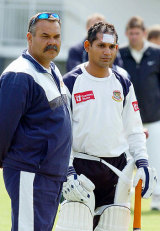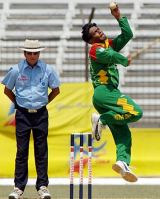
|

The men who matter most: One, a transformer of boys to men, the other a rock of stability and a symbol of continuity
© Getty
|
|
It's a poignant story : three little boys, who should be in school, or just out of it, going to play for a weak team in the World Cup, and beating up on a bunch of hardened pros who are strong title contenders. Tamim Iqbal, Saqibul Hasan and Mushfiqur Rahim, all not yet 18, took on the combined might of an Indian team that has players who have scored 10,000 runs in one-dayers, clocked over 300 matches, played international cricket for a decade-and-a-half, and came out smiling, on top.
It is such an amazing story that it will unfailingly capture the imagination of cricket fans around the world. But success stories, as any good team will tell you, are not ones that happen overnight. This trio, and Mashrafe Mortaza, will bask in the limelight for the moment, and that is only fair, but those who have been following Bangladesh's progress over the years will know that many good men have put in very hard yards, often unrewarded, even ridiculed.
Habibul Bashar
He might have not played a major part in the batting effort as Bangladesh chased down India's 191, being stumped going for glory, but his hand on the field was visible, and the manner in which he marshaled his bowlers actually put his opposite number in the shade on the day. But, it's worth remembering that Bashar has played in 42 of Bangladesh's 44 Tests since their admission to the highest form of the game, and even the two he missed, against New Zealand in 2004, were because of injury.
While the moniker Bangla Bradman might have more to do with the letter his name starts with than his batting average of 34.60, he has been, by a long way, the most consistent batsman Bangladesh have produced. When he's at the crease he looks of Test quality, and if it wasn't for a compulsive need to hook, his numbers might even be better. In a side where players are blooded young, and sometimes fade faster than they rise, he has been a rock of stability and a symbol of continuity. It's hard to imagine a Bangladesh team without Bashar on the team sheet.
Dav Whatmore
Seven Tests, 293 runs, an average of 22.53 and no hundreds. Nope, not the statistics of the average Bangladesh cricketer. These are Whatmore's stats as a Test cricketer. What does he know about Test cricket, asked some people who have had more success at the highest level. Just what can he possibly do as coach of a struggling team like Bangladesh? Well, if a coach's efficacy is to be judged by how much he has lifted the performance of his team, you'd struggle to beat Whatmore. If taking Sri Lanka to World Cup glory wasn't enough, he took on an assignment that was at best an impossible challenge, at worst career suicide.
Brick by brick, he has built this Bangladesh team. At first it was not merely the cricketers he needed to educate, but the cricketing establishment, who had little idea of what it took to administer the game. At a time when Bangladesh was being routinely thrashed, he gave the players belief, and pride, provoking them to individual performances before getting to a point where they could do a job together. The number of times he has had to turn a deaf ear to the scorn heaped on his team by former greats easily outstrips Bangladesh's not inconsiderable tally of losses. Yet, at a time when coaches openly describe teams other than the ones they're working with as personal favourites, and others look for plum assignments while still hands on with a team, he has stayed loyal, and true, to a tough job. Take your hat off to him, there's no dishonour in that.

|

Mohammad Rafique has gone from being the elder brother to a sort of father figure for aspiring Bangladeshi cricketers
© AFP
|
|
Mohammad Rafique
The records indicate that this tireless left-arm spinner is closer to his 37th birthday than his 36th. But then again, in the shantytown across the Buriganga river, on the fringes of Dhaka where Rafique is from, they're not famous for keeping records of birth all that accurately. He's gone from being the elder brother to a sort of father figure for aspiring Bangladeshi cricketers. The fact that problems with his action kept him out of the game from 12 Tests when the selectors chose to put their faith in Enamul Haque only motivated him to remedy his action and return - and not too many people do things like that at 31.
It's no coincidence that this most humble of cricketers has starred in each of Bangladesh's wins. He's on the verge of completing the allrounder's double of 1000 runs and 100 wickets in both forms of the game, and make no mistake about it, he will get there. It's also no coincidence that some of the most exciting talents coming out of Bangladesh are left-arm spinners. Young cricketers from more established Test countries may have brighter stars to emulate, but as role models go, Rafique is no-one poorer cousin.
Tapash Baisya
When Tamim was cracking the Indian bowling to all parts with some disdain, Mohammad Ashraful was sharing a laugh in the balcony. He was leaning on Tapash Baisya, and the two could not contain themselves. Although he was left out of the side that beat India, Baisya will not complain too much. Nowadays Bangladesh have, in Mortaza, Shahadat Hossain and Syed Rasel three extremely competent seamers. But it was not always so. For the longest time, from when he made his debut as a 19-year-old, there was only Baisya, putting in over after over. Never express pace, or tall enough to generate steeping bounce, accuracy was his forte. At a time when Bangladesh were trying out one fast bowler Baisya was someone who could be relied on to make a good fist of handling the new ball.
Anand Vasu is assistant editor of Cricinfo



